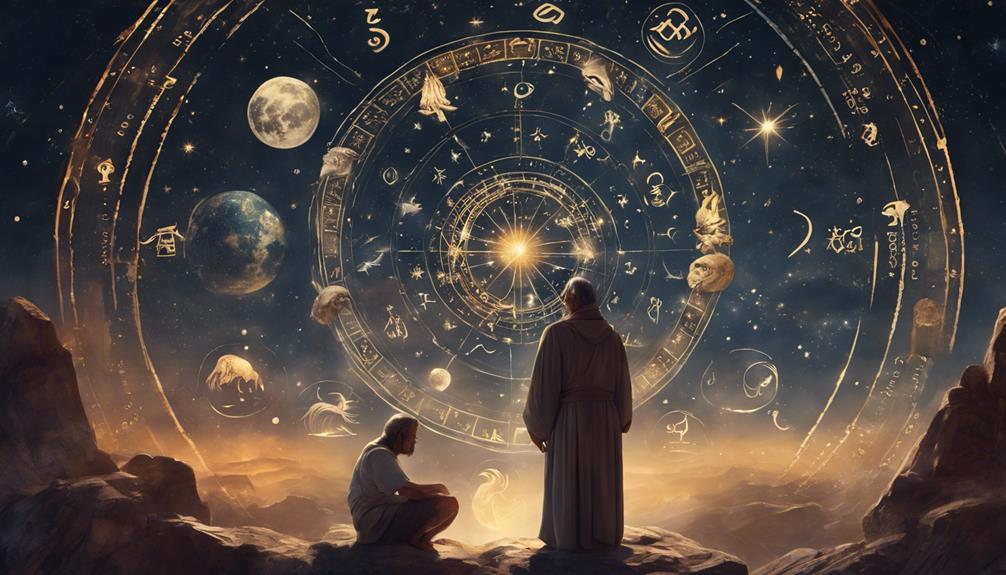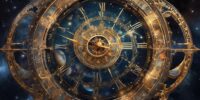When Did Astrologers First Identify the Concept of the Astrological Ages?

Astrological ages are defined by the position of the sun at the vernal equinox. Each age lasts approximately 2,000 years as the sun moves through each of the 12 zodiac signs. This concept dates back to ancient Babylonian astrology and has been passed down through various cultures and civilizations. The idea of astrological ages has been embraced by modern astrologers as a way to understand the broader cycles of human history and evolution.
Astrologers believe that we are currently transitioning from the Age of Pisces to the Age of Aquarius. This shift is said to bring about significant changes in society and individual consciousness. The Age of Aquarius is associated with themes of innovation, technology, and humanitarianism. While the exact timing of this transition is a subject of debate among astrologers, many believe that we are already beginning to feel the influence of the new age.
Ancient Observations of Celestial Movements
Ancient astronomers gazed upon the ever-changing tapestry of the night sky, marveling at the intricate dance of the celestial bodies as they traversed the dark expanse above. Their observations of the heavens weren't merely passive; they were filled with a deep understanding of the patterns woven by the stars and planets. Through meticulous recording and analysis of these ancient observations, they began to discern the subtle rhythms and cyclical movements that governed the celestial realm.
In these celestial patterns, they found a sense of order, a blueprint that hinted at a greater cosmic design. It was through these observations that they started to glimpse the interconnectedness of all things, the harmonious interplay between the earthly and the divine. The patterns they uncovered provided them with a sense of direction, a guiding light amidst the vast unknown.
As you delve into the ancient observations of celestial movements, may you be inspired by the wisdom of those who came before, and may you find liberation in the boundless expanse of the universe, where freedom and destiny dance in eternal harmony.
Babylonian and Egyptian Contributions
Bearing witness to the celestial splendor, the ancient civilizations of Babylon and Egypt made enduring contributions to the understanding of celestial movements. In the realm of Babylonian astronomy, scholars meticulously tracked the movements of celestial bodies, laying the foundation for the intricate astrological systems we know today. Meanwhile, the mystique of Egyptian astrology added a layer of spiritual significance to the observation of the stars, intertwining the cosmic dance with the affairs of humanity.
Unveiling the Mysteries:
- Babylonian Astronomy: Pioneering the study of celestial phenomena.
- Egyptian Astrology: Infusing spirituality into the interpretation of celestial events.
- Crossroads of Knowledge: Where Babylonian precision met Egyptian mysticism.
In the ancient lands of Babylon and Egypt, the skies weren't just a canvas of stars but a map of destiny, a tapestry woven with threads of wisdom and wonder. The wisdom passed down from these ancient cultures continues to inspire seekers of truth, inviting you to explore the vast cosmos with a spirit of freedom and curiosity.
Hellenistic Astrology and the Zodiac
As you delve into the realm of Hellenistic Astrology and the Zodiac, you'll uncover the intricate tapestry woven by ancient scholars to understand the cosmic dance of the stars.
The Zodiac in Hellenistic times served as a celestial map guiding seekers through the vast expanse of the universe, while the concept of Astrological Ages offered a glimpse into the cyclical nature of time and evolution.
Embrace the Age of Aquarius concept, for it heralds a new era of enlightenment and collective consciousness in the cosmic symphony of existence.
Zodiac in Hellenistic Times
During the Hellenistic period, the Zodiac played a pivotal role in shaping astrological beliefs and practices. The Hellenistic astrology of that time was heavily influenced by various cultural beliefs, resulting in a rich tapestry of astrological knowledge. The symbolism of the Zodiac held deep significance, reflecting ancient beliefs and philosophies that guided astrologers in interpreting the cosmos.
The twelve Zodiac signs were associated with specific traits and characteristics, influencing how individuals were perceived in society.
Astrologers believed that the positioning of celestial bodies within the Zodiac influenced human affairs and destinies.
The Zodiac served as a celestial map, guiding astrologers in understanding the interconnectedness between the heavens and earthly matters.
Astrological Ages Overview
In the realm of astrological studies, the Astrological Ages offer a profound insight into the interconnected tapestry of celestial influences and human destinies. Celestial cycles, with their historical significance, shape the fabric of time, guiding civilizations through epochs of change and growth.
Each Age, marked by distinct astrological symbolism, carries profound cultural implications that resonate across societies. These ages aren't mere arbitrary divisions but rather key chapters in the grand narrative of humanity's evolution.
As the zodiacal wheel turns and ushers in new eras, the Astrological Ages stand as beacons of wisdom, illuminating the path forward with their timeless teachings.
Embrace the wisdom of the ages, for within their celestial dance lies the key to unlocking the mysteries of existence.
Age of Aquarius Concept
Embark on a cosmic journey through the Age of Aquarius, where Hellenistic Astrology intertwines with the wisdom of the Zodiac, unveiling mysteries that transcend time and space. The New Age dawns as the Age of Aquarius heralds a period of spiritual awakening and enlightenment, inviting you to explore the depths of your being and the universe. Embrace the transformative energies of this celestial era, where ancient teachings merge with modern insights to guide you on a path of self-discovery and growth.
Explore the shifting cosmic energies that define the Age of Aquarius.
Embrace the concept of spiritual awakening and personal evolution.
Discover the profound influence of the Zodiac in navigating this new age of enlightenment.
Medieval European Astrological Traditions
As you embark on exploring Medieval European Astrological Traditions, you'll uncover the rich tapestry of European astrological origins intertwined with the cultural landscape of the Middle Ages.
The influence of medieval culture on astrological practices is profound, shaping the way astrology was perceived and utilized during this era.
Prepare to journey through a realm where celestial wisdom and earthly beliefs converge in a harmonious dance of cosmic significance.
European Astrological Origins
Entwined with the tapestry of Medieval European beliefs and practices lies the enigmatic realm of astrological traditions that captivated minds and influenced societies. European astrological origins trace back to ancient observations and have evolved over centuries, shaping the way people perceive the cosmos and their destinies.
The medieval European astrological traditions were rich in symbolism and intricate calculations, reflecting a deep connection between the celestial bodies and earthly events.
- Greek Influence: Greek astrology played a significant role in shaping European astrological beliefs.
- Arabic Translations: The translation of Arabic astrological texts into Latin contributed to the development of astrology in medieval Europe.
- Christian Adaptations: Astrology in medieval Europe often intertwined with Christian ideologies, creating a unique blend of spiritual and celestial interpretations.
Influence of Medieval Culture
Within the intricate tapestry of Medieval European culture, the astrological traditions of the time held a profound influence on the perceptions and interpretations of celestial phenomena and their impact on earthly affairs. Medieval influences shaped astrological practices, integrating them into various aspects of daily life and decision-making processes. Astrology was not only a tool for predicting the future but also a means of understanding the interconnectedness between the heavens and the earth. The cultural impact of astrology during this period extended beyond individual horoscopes, influencing fields such as medicine, politics, and religion. This integration of celestial knowledge into societal frameworks highlights the significant role astrology played in shaping the worldview of medieval Europe.
| Medieval Influences | Cultural Impact | Astrological Practices |
|---|---|---|
| Astrology in daily life | Understanding interconnectedness | Prediction and decision-making |
Renaissance and Enlightenment Era Perspectives
During the Renaissance and Enlightenment eras, scholars and philosophers delved into the realms of astrology with fervor, seeking to unravel the mysteries of the cosmos through intellectual inquiry and reason. Renaissance thinkers such as Marsilio Ficino and Johannes Kepler, along with Enlightenment figures like Isaac Newton, made significant contributions to the field of astrology by merging it with scientific principles. They believed that astrology could provide insights into the natural world and human behavior, blending ancient wisdom with modern scientific thought.
- Marsilio Ficino: Known for his revival of Neoplatonism, Ficino integrated astrology into his philosophical works, seeing it as a tool for understanding the interconnectedness of the universe.
- Johannes Kepler: Kepler, a key figure in the Scientific Revolution, explored the mathematical foundations of astrology, seeking to establish a scientific basis for astrological principles.
- Isaac Newton: Newton, famous for his laws of motion and universal gravitation, also studied astrology, viewing it as a potential scientific discipline that could explain celestial phenomena.
These thinkers paved the way for a new era of astrological inquiry, blending ancient traditions with modern scientific reasoning.
Modern Astrological Interpretations
In the realm of modern astrology, practitioners draw upon the foundational work of Renaissance and Enlightenment scholars to interpret celestial influences in contemporary contexts. Modern interpretations of astrology delve into the depths of psychological astrology, exploring the intricate connections between the cosmos and the human psyche. This approach goes beyond mere horoscope readings, seeking to uncover the profound impact celestial bodies have on our inner world and personal growth.
New age astrology, a prominent facet of modern astrological interpretations, delves into themes of spiritual evolution and cosmic consciousness. It invites you to embark on a journey of self-discovery, guiding you through the labyrinth of your soul's desires and challenges. By intertwining ancient wisdom with contemporary insights, modern astrologers offer a fresh perspective on how the movements of the stars can illuminate the path to self-realization and fulfillment.
Embrace the transformative power of modern astrology, allowing its wisdom to catalyze your journey towards a more enlightened existence.
Contemporary Views on Astrological Ages
Embark on a journey through the contemporary perspectives on Astrological Ages, where ancient wisdom converges with modern insights to unravel the mysteries of cosmic influence. In the realm of modern interpretations, Astrological Ages are viewed through a lens that combines tradition with innovation, offering a unique tapestry of understanding for those seeking cosmic guidance. Cultural influences play a significant role in shaping these contemporary views, infusing astrological concepts with the vibrancy of diverse belief systems and practices.
- Integration of Technology: Modern interpretations of Astrological Ages often incorporate technological advancements, utilizing digital platforms to disseminate astrological knowledge and connect with a global audience.
- Psychological Depth: Cultural influences have led to a deeper exploration of the psychological aspects of astrological symbolism, enriching the interpretation of how the Ages may impact individual consciousness.
- Interdisciplinary Approaches: Contemporary perspectives on Astrological Ages embrace interdisciplinary collaborations, blending astrology with fields such as psychology, sociology, and anthropology to offer multifaceted insights into cosmic influences on humanity.
Frequently Asked Questions
How Do Astrologers Determine the Beginning and End of Each Astrological Age?
In the intricate dance of the cosmos, astrologers discern the shifts between astrological ages through the alignment of celestial bodies. By interpreting zodiac symbolism and tapping into historical and mythical connections, they unveil the beginnings and ends with wisdom and insight.
Are There Any Major Discrepancies or Debates Among Astrologers Regarding the Timing of the Astrological Ages?
In the realm of astrological ages, debates simmer among practitioners over timing discrepancies. Embrace the freedom to explore varying perspectives, allowing wisdom to guide your understanding of these celestial cycles and their interpretations.
How Do Different Cultures and Traditions Interpret the Astrological Ages?
In cultures worldwide, interpretations of astrological ages vary. Different traditions offer diverse perspectives on historical shifts and global influences. Embrace the richness of these unique perspectives, allowing wisdom to guide your understanding.
Are There Any Specific Events or Phenomena That Astrologers Believe Mark the Transition Between Astrological Ages?
Events and phenomena in astrological beliefs signal transitions between ages. Look for celestial alignments, global shifts, and transformative occurrences. Astrologers find significance in these moments, guiding interpretations of the changing cosmic influences shaping our world.
What Role Does the Precession of the Equinoxes Play in the Concept of Astrological Ages?
In understanding astrological ages, the precession of the equinoxes holds great significance. It influences age calculation techniques, guiding the transition between eras. Embrace the wisdom of this celestial dance, for it shapes your cosmic journey.








